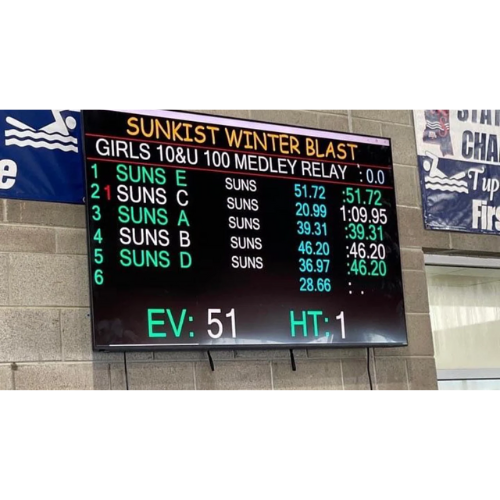- The Swimnerd Newsletter
- Posts
- French Sprinter Marie Wattel on Injury, Olympic Pressure, & Her Move to ASU
French Sprinter Marie Wattel on Injury, Olympic Pressure, & Her Move to ASU
“I realized it’s not a big deal not to win an Olympic medal. I’m still myself. My friends are there. My family loves me. Everything is fine.” - Marie Wattel
Help preserve our sport's history by becoming a monthly donor to the International Swimming Hall of Fame like us.
Marie Wattel, a French Olympian and world-class sprinter, opens up about the challenges she faced in the past year, including a devastating knee injury during her Olympic preparation. She discusses the mental and physical toll of chasing perfection, her decision to move to the States to train at Arizona State University (ASU) under Herbie Behm, and her fresh perspective on competition, swimming, and personal growth.

Devastating Knee Injury
The moment her knee gave out in the gym, Marie knew something was seriously wrong.
“I heard the noise, and I knew. I knew exactly that it was my cruciate ligament.”
Having previously suffered a partial ligament tear years earlier, she recognized the telltale signs of a full rupture. But with the Paris Olympics looming, surgery wasn’t an option - not yet. Instead, she pushed through, adjusting her training and doing everything possible to stay in top form. However, as the months passed, the stress on her body compounded. Shoulder pain, a back injury, and growing frustration made her realize that she had been pushing herself too hard and not listening to her body.
In hindsight, the injury was more than just a setback; it was a wake-up call. Marie had always trusted her instincts when it came to training, but in the lead-up to Paris, that connection with her body had faded. The pressure to be in peak form overrode her natural ability to listen to herself, and her body ultimately pushed back. Now, after undergoing surgery and stepping away from competition for a while, she’s focused on not rushing her recovery.
Medals Aren’t Everything
For years, Marie had her sights set on one goal: an Olympic medal. But after Paris came and went without one, she had a surprising realization - it didn’t define her. The weight of expectation had been immense, and yet, when it was all over, nothing really changed. Her friends were still there, her family still loved her, and she was still the same person.
“I realized it’s not a big deal not to win an Olympic medal. I’m still myself. My friends are there. My family loves me. Everything is fine.”
Now, instead of swimming solely for medals, she’s driven by curiosity and self-improvement. She knows she hasn’t reached her full potential yet, and that excites her more than any podium finish. She wants to refine her race strategy, sharpen her underwaters, and tap into the areas of her swimming that she hasn’t fully explored - like even more sprinting.
“U.S. is the best country in the world in swimming (along) with Australia, and yeah, I want to see what they do differently.”
Like many French swimmers, she’s coming to America.
Why Arizona State?
When her longtime coach in Marseille decided to step away from the sport, Marie was left searching for a new training home.
What drew her in? A combination of factors - the elite training group, the coaching philosophy of Coach Herbie, and the opportunity to be part of a dynamic, high-performance environment.
She had already listened to a few of Herbie’s podcasts and felt an immediate connection with his passion for the sport.
“I like Herbie and his philosophy about training. I think he’s really dedicated and really passionate about swimming.”
The presence of world-class swimmers like fellow Frenchman Léon Marchand also played a role in her decision. But more than anything, she was craving something new, challenging, and inspiring.
Marie has spent much of her career training alongside male swimmers, which pushed her to new levels but also came with limitations. At ASU, she’s looking forward to training with a strong group of female sprinters - athletes who will challenge her in different ways.
Taking the Next Step
Marie knows that her strengths lie in her strength and endurance, but she also acknowledges the areas that need work. Her underwaters and explosiveness off the blocks are two key aspects she’s eager to refine. She has her sights set on breaking 53 seconds in the 100 Free and 56 seconds in the 100 Fly - long course barriers.
“I feel like I have this in me. I just need to figure out how I’m going to achieve it.”
Marie is set to arrive at ASU in April 2025, after NCAA Championships. From there, she’ll train before heading back to France for Nationals in June, which will be her first competition post-injury. The long-term goal? A strong comeback at the 2025 World Championships and, ultimately, the 2028 Los Angeles Olympics.
More than anything, though, Marie is embracing this moment of change. She’s no longer just chasing medals - she’s chasing growth, knowledge, and the best version of herself.
Brett asks her about the home Olympics and France’s performances, her favorite type of sprint set, racing against Sarah Sjostrom, how Gretchen Walsh has redefined short course swimming with her underwaters, and what she listens to before she swims.
Enjoy!
Catch the full episode wherever you listen:
Timestamps:
0:00 - Hello Marie Wattel! 0:22 - The Knee Injury That Changed Everything 1:58 - The Moment It Happened: "I Heard the Noise and I Knew" 2:32 - Olympic Pressure & How It Broke Her Body 5:15 - Learning to Listen to Her Body Again 5:32 - "Not Winning an Olympic Medal Didn’t Change Who I Am" 6:05 - Why She’s Still Swimming: A New Purpose 7:19 - Why She Chose ASU & Herbie Behm 8:35 - Almost Moving to Australia & Mel Marshall’s Advice 10:10 - Training Background: From France to the UK & Marseille 12:28 - What Each Training Environment Taught Her 13:05 - Losing Her Longtime Coach & What’s Next 14:15 - How Team France Performed at the Paris Olympics 15:47 - The Flo Manaudou Comeback: A Forgotten Highlight? 16:33 - Moving to America: What She’s Expecting 17:52 - What U.S. Training Does Differently Than France 18:42 - Strengths & Weaknesses: What She Needs to Improve 19:42 - Body Image as a Female Sprinter & Comparing to Other Swimmers 22:31 - How Emma McKeon & Sarah Sjöström Inspire Her 23:20 - The French Swimming Federation’s Response to Her Move 24:35 - The One Swimmer She’s Grateful She Got to Race 25:18 - What Makes Sarah Sjöström So Special? 26:15 - Personal Best Times & Breaking Major Barriers 27:14 - Pre-Race Superstitions: Music & French Rap 27:48 - Favorite French Rapper: Jul from Marseille 28:03 - Favorite Sprint Workout: "10x25 Max on 3 Minutes!" 28:40 - If She Could Change One Swimming Rule… No More Underwaters? 29:25 - The Gretchen Walsh Effect: Mastering Underwaters 30:18 - Studying Footage of Gretchen Walsh & Léon Marchand 30:35 - The Surgery Process & When She Plans to Race Again 31:37 - Moving to ASU: When She Arrives & First Training Plans 32:15 - Plan for French Nationals & World Championships 32:57 - Final Thoughts: "Sometimes the Best Things Happen When You Least Expect It" 33:14 - Outro & Good Luck Message





